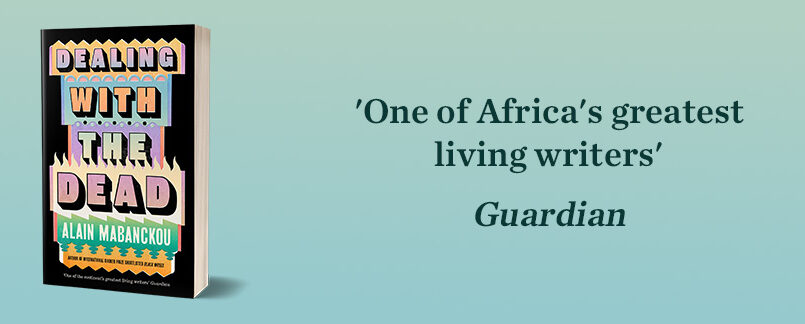10 January 2025
‘Sharp and entertaining’ Times Literary Supplement
‘Exuberant … Dealing with the Dead is often damning, frequently hilarious and always compassionate’ Financial Times
From one of Africa’s most celebrated novelists: a ghostly reckoning with Congolese history.
Abruptly deceased at the age of twenty-four and trapped forever in flared purple trousers, Liwa Ekimakingaï encounters the other residents of Frère Lachaise cemetery, all of whom have their own complex stories of life and death.
Unwilling to relinquish their tender bond, Liwa makes his way back home to Pointe-Noire to see his devoted grandmother one last time, against all spectral advice. But disturbing rumours swirl together with Liwa’s jumbled memories of his last night on earth, leading him to pursue the riddle of his own untimely demise. A phantasmagorical tale of ambition, community and forces beyond human control, Dealing with the Dead is a scathing satire on corruption and political violence by one of the foremost chroniclers of modern Central Africa.
Available from: Waterstones | Bookshop.org | Amazon
Refreshed by your wave of euphoria, you finally decide to get up. It’s the first time you’ve stood upright since you emerged from the tomb. Supporting yourself on the wooden cross, you manage somehow to straighten up without breaking it. You ignore the creaking of your elbow joints as you shake the reddish earth from your clothes. You’re wearing an orange crepe jacket with wide lapels, a fluorescent-green shirt with a large collar, three buttons and round musketeer cuffs. Your white bow tie is a little askew, so you adjust it, remembering how Mâ Lembé hated it when you wore it off-centre to church. You seem to have got a bit wet here and there; your shirt is a little damp in the armpits, down the back, round your belly. You must have been sweating back there in your casket, you think. You cast an admiring look at your purple flares, also of crepe, and your shiny red white-laced Salamanders. And since they might restrict your movement, you resolve to slip off your shoes and toss them from your grave, goggling at those elevator heels – after all, you’re not exactly lacking in the height department. You have to admit it: these shoes were a quick sell from some trader near where you work at the Victory Palace. It’s a French hotel, close by the Lumumba roundabout, and not far from there is the Grand Marché, where every day Pontenegrins fall upon the bundles of clothes and boxes of shoes that have been shipped out from France, mostly from Marseille, Bordeaux or Le Havre. Young people have a word for these hand-me-downs – sola, which means ‘choose’ in Munukutuba. The clothes arrive in Pointe-Noire packed tight, wrapped in plastic and sealed against theft. The shoes come in tough cloth bags, again tightly sealed. The big-time traders (Lebanese, Senegalese and Maghreb) buy them in bulk and pass them on to the little traders (the Pontenegrins) to sell at retail. Once the bales and bags have been opened and unpacked, the traders place the shoes and clothes in piles on squares of canvas spread out on the ground in the centre of the marketplace. The customers sniff at them like dogs, and try them on, heedless of the people watching them strip off in public. They put their selection to one side, or between their legs, and proceed to payment only after haggling for a considerable reduction, especially if they’ve found a hanging thread, a missing button, a loose label or a microscopic stain. Who cares if only the buyer can see them; the customer is always right, what matters is what he sees. No price is set in stone, it’s all ‘negotiable’.
As well as a whiff of sola – from the clothes bundles or, a more likely hypothesis, from the shop of your favourite Grand Marché trader, Abdoulaye Walaye – you pick up a stronger smell, of Mananas, a kind of eau de toilette sold in Lebanese shops and often sprinkled on corpses. No one would ever use Mananas in Pointe-Noire, people would think they were a ghost or that they worked in the cemetery or the morgue. You don’t recall quite when your clothes began to smell like this. But you do know you haven’t changed your outfit for close on five days now, which means these are the clothes you were buried in…


